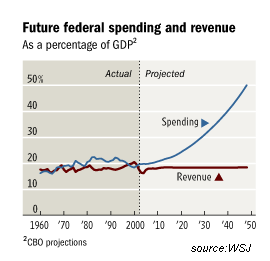

|
| weblog/wEssays | home | |
|
Huge Deficits and Huge Profits: Purely Coincidence? (December 8, 2005)  Is it mere coincidence that the Federal deficit has grown by a staggering
$1.5 trillion 2002-2005, while in the same 4-year timespan U.S. corporations
have amassed a staggering $1.5 trillion in cash profits? I am not
suggesting that corporations' unprecedented wealth has come at the expense of
the taxpayer, but... corporate taxes are at
40-year lows as a percentage of GDP. Here's a report from the
Center for Corporate Policy which substantiates this troubling trend.
Is it mere coincidence that the Federal deficit has grown by a staggering
$1.5 trillion 2002-2005, while in the same 4-year timespan U.S. corporations
have amassed a staggering $1.5 trillion in cash profits? I am not
suggesting that corporations' unprecedented wealth has come at the expense of
the taxpayer, but... corporate taxes are at
40-year lows as a percentage of GDP. Here's a report from the
Center for Corporate Policy which substantiates this troubling trend.
More troubling, perhaps than the decline of corporate taxes is where all those corporate profits are going. As mentioned here in the December 2 entry, "The companies in the Standard & Poor's 500-stock index are on track to pay out more than $500 billion to shareholders in the form of dividends and share repurchases, or buybacks, according to S&P. That's up more than 30% from last year's record -- and equivalent to nearly $1,700 for every person in the U.S." Did you (via mutual funds or retirement holdings) rake in $1,700 from corporate America this year? (or $6,800 for a family of four.) I reckon not, as the top 1% of Americans own 36% of all the nation's wealth, and the top 10% own 71%. The ownership of stocks and bonds is even more skewed: Over 86 percent of the value of all stocks and mutual funds, including pensions, was held by the top 10 percent of households. In 1998, the top 1 percent of Americans owned 47.7 percent of all stock, while the bottom 80 percent owned 4.1 percent.So unless you're one of the top wealth-holders in the country, you probably didn't receive much of Corporate America's largesse. Next, think about where the $350 billion interest on Federal Debt which we taxpayers paid out this year went: to the holders of the bonds, of course. So in a sense, the enormous Federal deficit means that average taxpayers are subsidizing the wealthy owners of all the debt we're accumulating (both foreign and U.S. holders) because corporate taxes have gone down even as their profits have reached unprecedented heights. If that doesn't make you question U.S. tax policy a wee bit, then consider the facts: In the past 12 months, real per-capita disposable incomes are down 0.1%. At the same time, corporate profits are up 16.5%. Third quarter productivity was revised up more than expected to 4.7% (consensus was 4.5%). In other words, American workers are producing more for less wages at the same time corporate profits are growing by 15% year-over-year for the past fourteen quarters. If you are a skeptic--for isn't this "the stakeholder economy"?--then read this piece from the Wall Street Journal entitled Economy Grows, Wages Won't. Still think you live and work in a "stakeholder economy"? Better keep an eye on who owns the stakes. * * * copyright © 2005 Charles Hugh Smith. All rights reserved in all media. I would be honored if you linked this wEssay to your site, or printed a copy for your own use. * * * |
||
| weblog/wEssays | home |